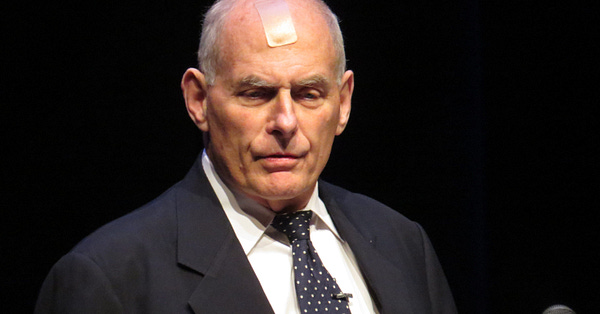Tangle is an independent, ad-free, non-partisan politics newsletter that offers both sides of the biggest news stories every day. If you found this online or someone forwarded you this email, please consider supporting balanced, independent journalism by subscribing below:
Today’s read: 7 minutes.
Trump’s former Chief of Staff goes off, a question about Bernie hate, and a story about TurboTax ripping you off.

Former Trump Chief of Staff and Marine Corps general John Kelly. Photo: DOD photo by Glenn Fawcett
Yesterday.
You got two Tangle emails. That’s not something that normally happens — and was a mistake on my part! But if you want to read or share the second email that came in, it was a fascinating interview with Rachel Bitcofer, the election forecaster who says Democrats are a near-lock to defeat Donald Trump in 2020. She is making waves in the prediction world and broke down how Democrats could blow it but why they’re so likely to win. You can read and share the story here.
Reminder.
Tangle hits your inbox Monday through Thursday, with the occasional Friday or weekend edition. That means this could be the last time you hear from me until Monday. Until then, enjoy your weekend and be sure to forward this email to friends who you think might dig Tangle.
Flashback.

What D.C. is talking about.
John Kelly. The former White House Chief of Staff unloaded on President Trump for the first time yesterday, criticizing some of Trump’s most significant moments in office during a wide-ranging, 75-minute long appearance at Drew University. Kelly, a retired U.S. Marine Corps general, has mostly kept silent since leaving the White House. Not anymore. He defended Lt. Col. Alexander Vindman, the National Security Council aide who testified against Trump, and said he was doing his job properly by notifying his superiors when he saw something questionable. “We teach them, ‘Don’t follow an illegal order,’” Kelly said. He described migrants as “overwhelmingly good people” and “not all rapists.” He said Trump did, in fact, condition military aid on Ukraine’s president digging up dirt on Joe Biden, noting it was a dangerous departure from unabashedly supporting Ukraine against Russia. He also touched on North Korea, saying Kim Jong Un will “never give up his nuclear weapons” and that he never thought he would, adding, “I never did think Kim would do anything other than play us for a while, and he did that fairly effectively.” The President, as he does, punched back on Twitter:

What the left is saying.
It’s just the latest example of someone who has worked for Trump telling us the truth about who he really is. It’s also remarkable and unprecedented if you really take the time to think about it. John Kelly is Trump’s former Chief of Staff. This isn’t some disgruntled low-level staffer — he was the president’s right-hand man. But that doesn’t mean he’s finding a receptive audience on the left. One over-arching reaction has been: why are you telling us this now? You waited so long to speak out, voice your opinion and be honest about the president. Now you do it at a time that’s basically useless. There are also a lot of liberals who will never forgive Kelly for pushing the family separation policy at the border that he said deterred immigrants from traveling to the U.S. Andrea Junker, a left-wing activist, said: “Friendly reminder that John Kelly proudly worked for a traitor, defended wife beater Rob Porter, lied about Congresswoman Frederica Wilson, and agreed with caging children.”


What the right is saying.
For supporters of Trump, John Kelly is just the kind of swamp creature Trump is purging from D.C. He got an opportunity to work with Trump and instead he used his powerful position as Chief of Staff to undermine the president at every turn. Jack Posobiec noted that he and Roger Stone reported on how Kelly was undermining Trump in 2017 and took a lot of heat for it. Tim Young noted that Kelly, John Bolton and Anthony Scaramucci all “loved Trump when they worked for him… then after they were fired, they realized that they could sucker the left into buying anything from them if they turned on him.” Jim Hanson took direct issue with Kelly’s characterization of Vindman, saying he “actively” undermined the Commander-in-Chief long before he ever testified against him. Trump responded on Twitter, saying Kelly “came in with a bang, went out with a whimper, but like so many X’s, he misses the action and just can’t keep his mouth shut, which he actually has a military and legal obligation to do.” Even some never-Trump Republicans were unimpressed with Kelly, saying that he spoke up too late and did too little when it would have really mattered to impede the Trump insanity.




My take.
I remember when John Kelly was hired by the Trump administration. All the headlines looked similar: Kelly would stabilize Trump, normalize the presidency, reign in his worst qualities and bring the White House to order. The New York Times said he’d be a “beacon of discipline.” Kelly came on after serving as the secretary of homeland security, where he was largely in control of our immigration policies. Nearly three years later and that time is like a fading memory. Kelly did little to bring order to the White House — in fact, he may have made things more chaotic given his fundamental differences with Trump. He was once quoted as saying “This is the worst [expletive] job I’ve ever had” and getting fired “would be the best day I’ve had since I walked into this place.” Kelly is a good example of what can happen to certain kinds of establishment conservatives with good reputations who join Trump’s White House. Ultimately, if they lose the favor of the president, they lose the favor of his supporters. And if they don’t do enough fast enough to challenge or stand up to Trump, they lose the favor of the never-Trump Republicans who once supported them, too. It appears Kelly is one of the latest victims of what can go wrong when you join the White House.
Your questions, answered.
Reminder: I want to hear from you! If you’re reading this, please consider submitting a question. All you have to do is write in and tell me where you’re writing from. I’ll get to it in an upcoming newsletter.
Q: I have a question about Bernie Sanders. How come so many people don’t like him? Why do people view him as so unelectable? Could you break down why he is so dismissed? I understand he is super liberal but I don’t feel like the things he stands for are like so crazy that would warrant the pushback?
- Nicole, Allentown, PA
Tangle: The Bernie Sanders divisiveness is a really great look into the Democratic party. As far as I can tell, there are three central points that people who don’t like Bernie harp on: 1) His policies are unrealistic and could never become law. 2) He is a career politician who has gotten very little done in his time in Congress. 3) His campaign is divisive and his supporters are toxic.
When it comes to his policies, I’ll give you my competing views on how this argument plays out. Sanders is absolutely overpromising when it comes to eliminating college debt, Medicare for All, or The Green New Deal. He rarely gets into the nitty-gritty of the policies, but typically pitches them as the revolutionary goals that will reshape America. The danger of these proposals is what voters do when they find out how the policies will change their day-to-day lives. For instance, Medicare for All is really popular with voters — until they find out that it will totally eliminate private insurance. Sanders also often makes Medicare for All sound like a light switch he will turn on, when in fact his policy calls for a slow, arduous transition (that’s a lot more realistic!) but will presumably be a much bumpier ride than his supporters may expect.
There’s also a strong argument from moderate Democrats and conservatives that the government sucks at getting things done. Fundamentally, Sanders is calling for a massive government takeover of some of the most important industries in America. His proposals to fight climate change move us to renewable resources for electricity by 2030. On the surface, that’s a goal most thinking Americans (who don’t work in the fossil fuel industry) would probably support. Renewables are cheaper and better for the environment. Sounds great, right? But the plan would pretty obviously box out private companies that currently employ hundreds of thousands of people from the power industry, and has no clear plan for what to do with the workers who would lose their jobs if they weren’t supplying power for Americans. There are also the people who see the renewable energy industry already taking over and wonder why the government has to step in to take a piece of the pie — just let the private market do its thing. On one side, you have Sanders imploring us that climate change is a life or death threat. On the other side, you have moderates and conservatives infuriated that he has no plan for all the people who will be out of work should his plan come to fruition.
The second big reason people dislike Sanders is because he’s viewed as a divisive, uncompromising figure in Congress unable to get things done. Sanders is an independent, not a Democrat, and the stories of him walking the halls of D.C. as an unfriendly, uninterested curmudgeon who is incapable of working with people are endless. The New York Times editorial board basically said as much when it opted not to endorse him — he was framed as divisive and unwilling to work with people he doesn’t agree with. Pete Buttgigieg is using a similar attack line, saying that we can’t have a revolution or nothing attitude. And while Sanders has been in Congress for decades, most of his biggest accomplishments are amendments, which are basically additional language added onto must-pass bills to sneak in priorities rather than major legislation drafted and pushed through Congress by whipping votes. Some speak adoringly of Sanders’ craftiness in drafting amendments, others see it as a weakness that shows he can’t get bipartisan support for major bills. Hillary Clinton made a similar case, saying that nobody likes Bernie and nobody wants to work with him. The Democratic strategist and Tom Steyer advisor Jimmy Williams backed her up in a Tangle exclusive interview from a few weeks ago. Sanders himself has proudly boasted that he’s not going to kiss up to people or compromise to pass half-assed legislation, either.
There’s another side of this, though, and I think it’s worth noting. Sam Stein wrote a great piece in The Daily Beast where he interviewed high-ranking members of the Democratic party who basically said they could always rely on Sanders. Instead of framing him as an unwilling idealogue who can’t be worked with, they viewed him as someone who would stake out a strong position on the left and work towards the middle — but would hold out as long as he could to get the party as far to the left as possible. To Sanders supporters, that’s the guy they want as president. The late John McCain put it like this: “Negotiating with Bernie was not a usual experience, because he is very passionate and he and I are both very strong-willed people and we spend a lot of time banging our fists on the table and having the occasional four-letter word,” McCain once said. “But at the end of the day, Bernie was result-oriented.”
Finally, and perhaps most importantly, is 2016. During the election against Hillary Clinton, Sanders’ supporters were known for having certain vitriol that was unmatched online. They frequently cast her in a more negative light than some Trump supporters did, the Sanders staff was not particularly diverse, the “Bernie Bro” was viewed as a young, white, sexist man, and Sanders himself went hard on Clinton — framing her as corrupt and incapable of beating Trump. All that left a sour taste in a lot of people’s mouths. As someone who was very online in 2016, I can definitely attest to the fact that Sanders supporters had a tendency to “swarm” anyone who came for Bernie. They still do it today. But I also think the ugliness from them was not in a totally different realm than what I saw from some Hillary supporters during the campaign. Sanders is just preaching a message that is much more about burning it all down and starting something new, and I think that always lent itself to a much more “take no prisoners” kind of attitude from his supporters.
Together, these three major concerns wrap into a 2020 fear of Sanders: that he can’t get elected. His calls for banning fracking and crushing the fossil fuel industry make it hard to imagine him winning in states like Pennsylvania or Michigan, which are crucial to a 2020 victory. His beef with the Democratic party makes it hard to imagine the establishment types rallying around him if he’s the nominee, which could be the kill shot for Democrats against Trump. And the damage some of his supporters have done to his reputation could make it tough for some former Hillary fans to hop on the Sanders train in 2020. I think all of this contributes to the sense that a lot of people just don’t like him.
A story that matters.
An audit released on Wednesday says that the TurboTax maker Intuit, H&R Block and other tax software companies charged more than 14 million taxpayers for tax prep software they could have gotten for free. The audit, conducted by the Treasury Inspector General for Tax Administration, came after a ProPublica reported from last year explored why so few Americans use the Free File program to do their taxes. It turns out a confusing design, lax oversight by the IRS and private companies directing people away from the free file programs have all contributed. Intuit, the maker of TurboTax, and other similar programs brought in over a billion dollars of revenue by charging consumers for stuff that could have otherwise been free. Reforms to the Free File program now bar companies from hiding their free products in search engines like Google and scrapped a dated prohibition on the IRS creating its own free filing system. Now onlookers are waiting to see whether the IRS will create and release that system for the public. It’s a troubling look at how the private-public sector can interact. Click.
Numbers.
44%. President Trump’s approval rating amongst registered voters, according to a Reuters/Ipsos poll.
41%. President Trump’s approval rating amongst the general population, according to a Reuters/Ipsos poll.
60,363. The latest count of confirmed cases of coronavirus globally.
14. The total number of confirmed cases in the U.S (depicted below, courtesy of Johns Hopkins).

$5.8 billion. The expected loss the travel industry will take on due to travel restriction imposed to contain the coronavirus.
3.24 million. The total number of workdays lost last year due to labor strikes and lockouts, the most since 2004, according to the Bureau of Labor Statistics.
425,000. The estimated number of workers who joined work stoppages last year.
Have a nice day.
A South Carolina man who nearly threw away a $100,000 winning lottery ticket managed to recover the winning piece of paper before it was too late. The man had purchased the ticket at a gas station in South Carolina and threw the ticket in the trash after reviewing the results. But later that day, he realized he had actually been looking at the lottery results for the day before. His ticket had actually matched all five numbers drawn on the day he bought it. For what it’s worth, the odds of you winning the Palmetto Cash 5 is one in 501,942, about the same odds as winning an Olympic gold medal or being killed by a meteor. You’re about 50 times more likely to win an Oscar (this is me telling you not to waste your money on lottery tickets). Click.
Don’t forget.
Sharing is caring. If you like Tangle, forward this email to friends or post about Tangle on social media by hitting the button below.



